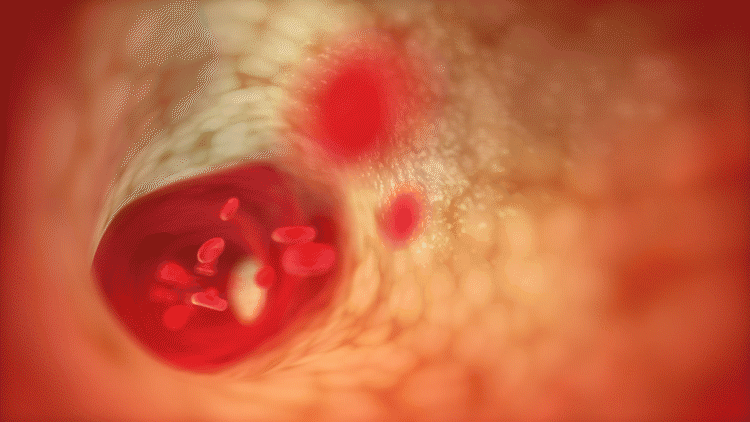If you took all the people on Earth with atherosclerosis and moved them to a single country, it would be the most populous nation on the planet. Those relocated would wonder why they were chosen, because their condition – caused by high cholesterol – is invisible.
It is also potentially deadly.
Atherosclerosis, caused by a buildup of cholesterol that forms plaques in arteries, increases the risk of cardiovascular disease, such as a heart attack and stroke. Despite the availability of approved medicines, heart disease remains the No. 1 cause of death by chronic disease worldwide.

Science, however, has uncovered new ways to lower cholesterol. For instance, researchers have been able to prevent the production of disease-driving proteins in the body using therapies targeting RNA, instructions used by cells to make proteins. RNA-targeting therapies are a new approach to medicine that has the potential to stop disease-causing biology at its roots. Novartis is working to develop these emerging RNA therapies in the hope they can provide doctors with more options to help people lower their cholesterol and reduce the risk of heart disease.
Cardiovascular disease kills more people than any other disease, causing 18 million deaths each year. This toll is predicted to rise to nearly 24 million by 2030. In the 60 seconds you’ve taken to read this far, about 34 people worldwide have died from a heart attack or stroke due to atherosclerosis.

Drugs that lower cholesterol are available, yet approximately 75% of people who have already developed atherosclerosis have difficulty reaching medically recommended cholesterol levels. This is a problem because the disease that results from high cholesterol is invisible, slow to develop, and quick to become dangerous.
“Despite the fact that we have effective drugs to prevent it, the No. 1 killer is still heart disease,” says Markus Hinder, an expert in cardiovascular medicine at Novartis.
A persistent challenge
Fifty years ago, the risk of death from heart disease in the US was much higher than it is today.
Scientists had discovered LDL cholesterol, now commonly known as “bad” cholesterol because it causes the buildup of plaques in arteries, in the 1950s. They learned that the higher the LDL cholesterol, the higher the risk of death from cardiovascular disease or stroke. But it wasn’t until the 1970s that they began to understand how LDL cholesterol levels are regulated in the body.
Despite the fact that we have effective drugs to prevent it, the No. 1 killer is still heart disease.
Markus Hinder
Statins, which interfere with the production of cholesterol, followed in the 1980s. Over the course of the next two decades, rates of death from heart disease dropped by half.
Recently, however, the number of people dying from heart disease has been on the rise, despite the availability of medicines that lower cholesterol. During 2020, that uptick has increased due to the COVID-19 pandemic, which has made it harder for people with heart disease and high cholesterol to see their doctors regularly and seek emergency care for heart attacks and strokes.
It turns out that – pandemic or not – lowering LDL levels adequately is challenging. Statins are an option. So are lifestyle changes, such as eating a healthy diet and exercising. Yet for many, these interventions aren’t sufficient.
“For many, even if they live a monk’s life and take a statin, they have elevated cholesterol,” says Hinder.
For people with gene mutations that cause extremely high cholesterol, diet and exercise have almost no influence on cholesterol levels. Even for patients without these inherited risks of high cholesterol, genetics plays a large role.
“Physicians may be able to get their patients’ levels lowered, but not low enough. They end up in a state of clinical inertia,” says Robert Stoekenbroek, a Medical Director at Novartis who specializes in cardiovascular disease.
A person might feel perfectly healthy for decades with slightly elevated cholesterol levels. But inside the vessels, plaques are building up, vessels are changing shape to accommodate the buildup, and the risk of a stroke or heart attack is rising over time.
Tens of millions of people worldwide may be trapped in this state of clinical inertia. “This underscores the need for new medicines,” says Hinder.
Science drives progress
Over the past two decades, researchers have learned a lot about how the body regulates cholesterol levels. That science has led to the discovery of more proteins that can contribute to intractably high levels of unhealthy cholesterol.
In parallel, scientists have harnessed the potential of RNA-targeting therapies, a new form of medicine that makes it possible to block the production of a disease-related protein. This is a shift from existing medicines, which typically disable or interfere with the activity of a protein.
“RNA-targeting medicine has the potential to very specifically prevent production of a disease-driving protein in the first place, rather than mopping up the floor after it has already been produced,” says Stoekenbroek.
These two parallel advancements are intersecting to propel a new wave of drugs that have the potential to provide physicians with completely new ways to lower cholesterol. Clinical trials are underway to determine the safety and efficacy of two experimental medicines that aim to lower cholesterol by targeting RNA.
“This has the potential to have a positive effect on the health of a large population of people worldwide,” says Stoekenbroek.
Main image: Courtesy Shutterstock - Show Must Go On



